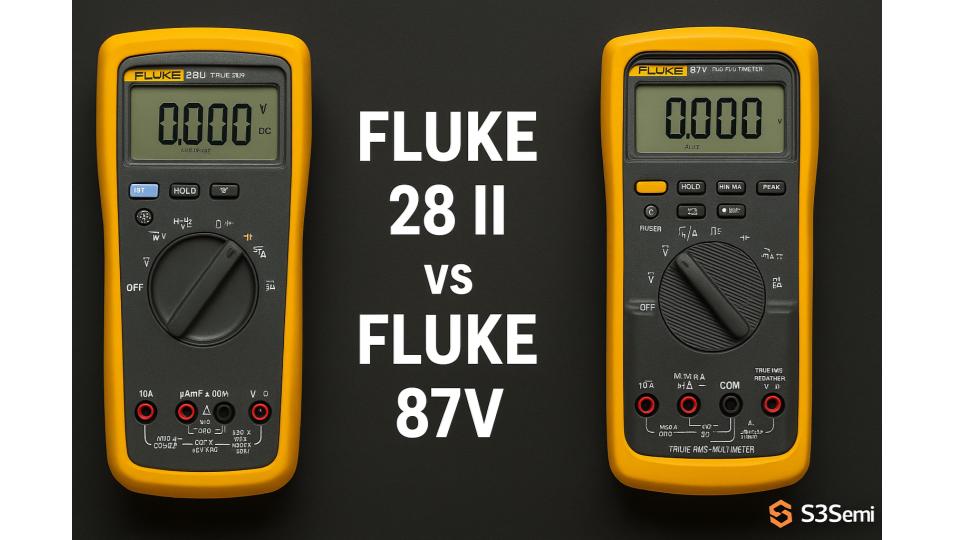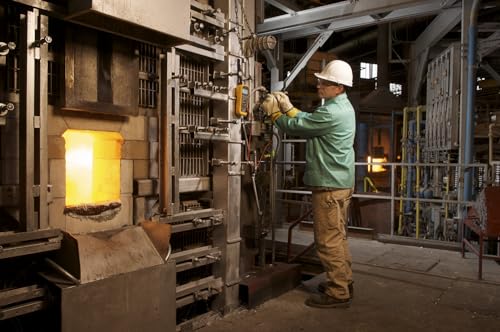Fluke’s industrial-grade digital multimeters are trusted worldwide for their accuracy, durability, and safety. Two of the most popular models in this category are the Fluke 28 II and the Fluke 87V.
🏷️ Fluke Multimeter Deals ⭐⭐⭐⭐
While they share many similarities, they are designed with different priorities: one is a rugged, waterproof multimeter, while the other is a precision troubleshooting meter for complex electronics and industrial systems.
Let’s compare them side by side.
📋 Quick Overview
- Fluke 28 II: A rugged, waterproof, and dustproof multimeter, designed for the harshest environments. It’s built to withstand drops, shocks, and extreme conditions.
- Fluke 87V: A precision industrial multimeter, ideal for troubleshooting motors, drives, power systems, and sensitive electronics with its advanced measurement features.
📊 Fluke 28 II vs Fluke 87V Comparison Table
| Feature | Fluke 28 II | Fluke 87V |
|---|---|---|
| Display | 20,000-count LCD with backlight | 20,000-count dual LCD |
| True-RMS | Yes | Yes |
| AC/DC Voltage | Up to 1000V | Up to 1000V |
| Current Measurement | Up to 10A | Up to 20A (30s overload) |
| Resistance | Up to 50 MΩ | Up to 50 MΩ |
| Capacitance | Up to 10,000 µF | Up to 9,999 µF |
| Frequency | Up to 200 kHz | Up to 200 kHz |
| Temperature Measurement | Yes (with probe) | Yes (with probe) |
| Special Features | Waterproof (IP67), drop tested (3m), dustproof, extreme durability | Low-pass filter for VFDs, fast min/max (250 µs), selectable filter |
| Safety Rating | CAT III 1000V, CAT IV 600V | CAT III 1000V, CAT IV 600V |
| Battery Type | 3 × AA | 9V battery |
| Size & Weight | Larger, ~698 g | ~624 g |
| Target User | Field technicians in harsh environments | Industrial electricians and engineers |
| 💳 Pricing | 💲Check Price | 💲Check Price |
✅ Pros & Cons of Fluke 28 II
Pros
- Extremely rugged (IP67 waterproof, dustproof, drop-tested)
- True-RMS accuracy
- Wide operating temperature range
- Perfect for outdoor and field work in tough conditions
- Excellent safety ratings
Cons
- Heavier and bulkier than the 87V
- Fewer advanced troubleshooting features
- More expensive than mid-range Fluke meters
✅ Pros & Cons of Fluke 87V
Pros
- Highly accurate True-RMS readings
- Advanced diagnostics (low-pass filter, fast min/max capture)
- CAT IV safety rating for industrial use
- Handles higher current (20A vs 10A)
- Widely considered the benchmark professional DMM
Cons
- Not waterproof or dustproof
- Less rugged compared to Fluke 28 II
- Slightly less durable in extreme field conditions
🛠️ Which One Should You Choose?
- Choose the Fluke 28 II if you’re working in harsh environments such as construction sites, outdoor fieldwork, mining, or industrial facilities where water, dust, and physical impact are common.
- Choose the Fluke 87V if you need precision troubleshooting features for motors, variable frequency drives, and sensitive electronics in industrial environments.
In short:
- 28 II = Rugged field-ready multimeter
- 87V = Precision industrial troubleshooting tool







